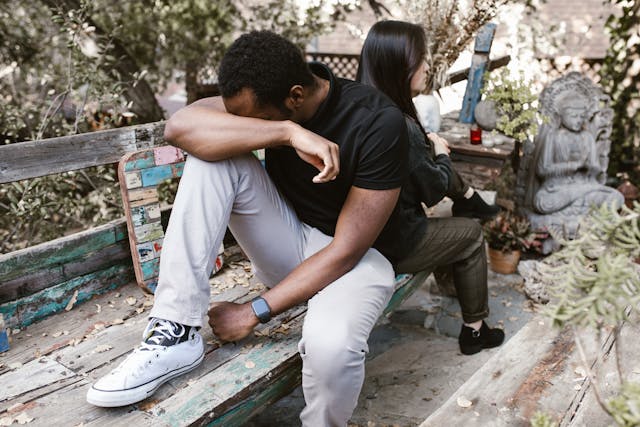10 Things People Do When They’re Secretly Insecure

Insecurity doesn’t always look like self-doubt.
Sometimes it dresses itself up in confidence. Sometimes it hides behind sarcasm, perfectionism, or a carefully curated image. The truth is, the most insecure people aren’t always the ones crying in the corner—they’re often the ones laughing the loudest, striving the hardest, or criticizing the most.
We all wrestle with insecurity from time to time. It’s part of being human. But when those insecurities run deep and go unaddressed, they often show up in ways we don’t recognize—not even in ourselves.
Here are 10 things people commonly do when they’re secretly insecure—and why awareness is the first step toward healing.
1. They Overcompensate with Bragging or Showiness
Ever met someone who constantly talks about their achievements, possessions, or how amazing their life is? It might seem like confidence—but often, it’s a cover.
When people feel unworthy inside, they try to validate their value on the outside. They name-drop. They exaggerate their success. They need everyone to see how “well” they’re doing—because deep down, they don’t fully believe it themselves.
True confidence doesn’t need to announce itself. Insecurity, however, loves attention.
2. They Constantly Seek Validation
“I did okay, right?” “Do you like this outfit?” “Should I post this?”
Insecure people often look outward for reassurance because their inner voice isn’t supportive.
This validation-seeking can show up in many forms: oversharing on social media, needing compliments from a partner, or asking for constant feedback. It’s not that they’re fishing for compliments—it’s that they genuinely need them to feel okay.
While everyone likes to be reassured sometimes, chronic validation-seeking points to an inner void that external approval can’t truly fill.
3. They Tear Others Down (Subtly or Overtly)
When someone is deeply insecure, other people’s confidence can feel like a threat. Instead of celebrating others, they critique them—sometimes with passive-aggressive “jokes,” backhanded compliments, or unnecessary comparisons.
It’s not always malicious. Often, it’s projection. If they feel small inside, making others feel smaller is their way of leveling the playing field.
The most secure people lift others up. The most insecure? They can’t celebrate anyone without it feeling like a loss.
Don’t Miss: 10 Things A Man Only Does in Bed When He Really Loves You
4. They Avoid Vulnerability at All Costs
Vulnerability requires self-acceptance. Insecure people often struggle with that, so they build emotional walls to avoid being seen too deeply.
They may joke their way out of serious conversations, avoid talking about their past, or shut down when asked how they’re really feeling.
It’s not that they don’t want closeness—they’re afraid of being exposed. They fear that if someone saw the “real” them, they wouldn’t be enough.
5. They Struggle to Take Criticism (Even Constructive)
Feedback—even when kind and well-intended—can feel like a personal attack to someone who’s insecure. Instead of hearing the message, they hear confirmation of their worst fears: “You’re not good enough.”
This can lead to defensiveness, anger, or shutting down completely. Their worth feels so fragile that even gentle correction feels like rejection.
Confident people can separate who they are from what they do. Insecure people often can’t—so every critique feels like a character flaw.
You May Like: 15 Secrets To Instantly Boost Your Confidence
6. They Over-Apologize
“I’m sorry” becomes a reflex for insecure people—even when they’ve done nothing wrong. They apologize for asking questions, taking up space, or simply existing in a way they fear might inconvenience others.
This chronic apologizing often stems from a deep-seated belief that they’re a burden. They’d rather shrink than risk disapproval or rejection.
Confidence says, “I belong here.” Insecurity says, “I hope it’s okay if I stay.”
7. They Struggle to Say “No”
People-pleasing is one of the most common masks of insecurity. Insecure people often tie their worth to how much others like them. So they say “yes” to avoid disappointing anyone—even when it costs them their peace.
They’ll overcommit, overextend, and over-apologize just to maintain approval. They may seem “easygoing” on the outside, but inside, they’re exhausted and resentful.
Learning to say “no” is a powerful step in healing insecurity. It signals self-respect and trust in your own boundaries.
Don’t Miss: 12 Habits That Damage Your Brain (Without You Realizing It)
8. They Try to Control Everything
Insecurity breeds fear—fear of failure, of being judged, of not being enough. One way people try to cope with that fear is through control.
They micromanage details, obsess over outcomes, or get uncomfortable when things don’t go their way. The tighter they grip, the safer they feel.
Unfortunately, control is a false sense of security. Real peace comes from flexibility, not perfection.
9. They Struggle to Celebrate Others’ Success
Someone else gets promoted, engaged, or praised—and they suddenly feel less than.
Insecure people often operate from a scarcity mindset. They see someone else’s win as their loss. So instead of celebrating others, they feel triggered, envious, or dismissive.
This isn’t because they’re unkind. It’s because they haven’t yet learned that someone else shining doesn’t make them any less bright.
10. They Hide Behind Perfectionism
Perfectionism is often a disguise for insecurity. On the surface, it looks like high standards. But underneath? It’s fear—of being seen as flawed, of being judged, or of not being worthy if they mess up.
Insecure perfectionists put immense pressure on themselves to “perform.” They might delay starting something, over-edit their work, or burn out trying to meet impossible expectations.
The antidote isn’t lowering standards—it’s realizing that your worth isn’t tied to performance. You are enough, even when you’re imperfect.
You May Like: 10 Commandments of Marriage According to the Happiest Couples Alive
Final Thought: Insecurity Isn’t Weakness—It’s Woundedness
If you saw yourself in any of these behaviors, don’t beat yourself up. Insecurity doesn’t make you broken—it means you’ve been hurt somewhere along the way. Maybe you weren’t affirmed growing up. Maybe you were compared, criticized, or conditioned to believe love had to be earned.
But here’s the truth: You’re allowed to rewrite that story. You can learn to speak to yourself with kindness, to trust your worth, and to let go of the masks.
Confidence isn’t about being perfect—it’s about being honest. About knowing you have value, even when you’re still healing.
And it starts with awareness. Because once you see the patterns, you can change them.
FAQs: Things People Do When They’re Secretly Insecure
- Are these behaviors always signs of insecurity?
Not always. Everyone has off days. But when these behaviors are constant and deeply rooted, they often point to underlying insecurity. - Can insecure people become confident?
Absolutely. Confidence is learned, not inherited. With self-awareness, therapy, and consistent inner work, people can unlearn insecurity and rebuild self-trust. - Is it bad to seek validation sometimes?
No. It’s human. But if your self-worth depends entirely on others’ approval, it might be time to look inward and build your own validation from within. - How can I help someone who’s clearly insecure?
Be kind, but don’t enable the behavior. Offer support, encouragement, and honest feedback. Remind them of their strengths—and lead by example. - What’s one practical step to start healing insecurity?
Start by paying attention to your inner dialogue. Challenge negative thoughts. Replace “I’m not good enough” with “I’m doing my best, and that’s enough for now.”






